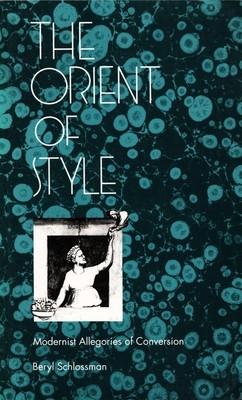
- We will send in 10–14 business days.
- Author: Beryl Schlossman
- Publisher: Duke University Press
- ISBN-10: 0822310945
- ISBN-13: 9780822310945
- Format: 15.2 x 22.9 x 1.7 cm, minkšti viršeliai
- Language: English
- SAVE -10% with code: EXTRA
Reviews
Description
In this study of modernist aesthetics, Beryl Schlossman reveals how for such writers as Marcel Proust, Gustave Flaubert, and Charles Baudelaire, the Orient came to symbolize the highest aspirations of literary representation. She demonstrates that through allegory, modernism became a style itself, a style that married the ancient and the modern and that emerged as both a cause and an effect, both an ideal construct and an textual materiality, all symbolized by the Orient-land of style, place of plurality, and site of the coexistence of holy lands.
Toward the end of Remembrance of Things Past, the narrator describes the act of creating a work of art as a conversion of sensation into a spiritual equivalent. By means of such allegories of "conversion," Schlossman shows, the modernist artist disappeared within the work of art and left behind the trace of his sublime vocation, a vocation in which he was transformed, in Schlossman's words, "into a kind of priest kneeling at the altar of beauty before the masked divinity of representation."
The author shows how allegory-the representation of the symbolic as something real-was adapted by modernist writers to reflect subjectivity while masking an authorial origin. She reveals how modernist allegory arose, as Walter Benjamin suggests, at the crossroads of history, sociology, economics, urban architecture, and art-providing a kind of map of capitalism-and was produced through the eyes of a melancholic gazing at a "monument of absence."
EXTRA 10 % discount with code: EXTRA
The promotion ends in 22d.16:51:16
The discount code is valid when purchasing from 10 €. Discounts do not stack.
- Author: Beryl Schlossman
- Publisher: Duke University Press
- ISBN-10: 0822310945
- ISBN-13: 9780822310945
- Format: 15.2 x 22.9 x 1.7 cm, minkšti viršeliai
- Language: English English
In this study of modernist aesthetics, Beryl Schlossman reveals how for such writers as Marcel Proust, Gustave Flaubert, and Charles Baudelaire, the Orient came to symbolize the highest aspirations of literary representation. She demonstrates that through allegory, modernism became a style itself, a style that married the ancient and the modern and that emerged as both a cause and an effect, both an ideal construct and an textual materiality, all symbolized by the Orient-land of style, place of plurality, and site of the coexistence of holy lands.
Toward the end of Remembrance of Things Past, the narrator describes the act of creating a work of art as a conversion of sensation into a spiritual equivalent. By means of such allegories of "conversion," Schlossman shows, the modernist artist disappeared within the work of art and left behind the trace of his sublime vocation, a vocation in which he was transformed, in Schlossman's words, "into a kind of priest kneeling at the altar of beauty before the masked divinity of representation."
The author shows how allegory-the representation of the symbolic as something real-was adapted by modernist writers to reflect subjectivity while masking an authorial origin. She reveals how modernist allegory arose, as Walter Benjamin suggests, at the crossroads of history, sociology, economics, urban architecture, and art-providing a kind of map of capitalism-and was produced through the eyes of a melancholic gazing at a "monument of absence."


Reviews